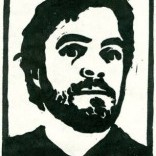A Recipe for Certain Times of Life
Jill Storey
I have decided to give you my recipe for scrambled eggs. You may not think this is much of a gift, but I promise these are no ordinary eggs. So stop what you’re doing, and listen.
First, gather eggs, still warm, from the chicken coop. The chickens won’t mind, especially if you sprinkle some cracked corn on the ground to distract them. If you’re by yourself, you could take two, but take at least four; you want to be open to the unexpected. Carefully wash off the sticky bits of straw and streaks of mud from the shells. Apologize to each egg for what you are about to do. Now crack them into a bowl, perhaps one that belonged to your grandmother and is dinged or chipped from the time she dropped it when your mother came running into the kitchen shouting that Joe, the one with long eyelashes who plays the cello, has invited her to the dance. Give the empty eggshells to your cat to lick. Regard the eggs floating in the bowl, like glaring eyes that seem to look back at you. Check for bits of eggshell and if you find any, fish them out with a piece of bread or a spoon, or be bold and just plunge in with your forefinger, shiver at the slimy feel of the whites against your skin, trap the elusive specks under your fingernail and slide them out.
Next, mix the eggs with a fork or a whisk. Not an eggbeater, I find it’s too violent. Notice how the yolks resist breaking, they are so firm and proud, but eventually they do, and their tangerine tinge lightens as it blends with the glassy whites. Add a splash of milk or cream and a brief shower of sea salt.
Get out a medium size pan. Cast iron, seasoned over many years, is good; its weightiness testifies to the gravity of the alchemy about to take place. Put in a small chunk of butter and set the pan on the stove over the lowest heat possible. The flame should be barely visible, like the afterglow of the fireplace when you and your lover have fallen asleep in the easy chair.
Now you might want to put on some music. Something slow and languid; Beethoven’s Piano Concerto No. 5 would work beautifully, or maybe Stan Getz (before his bossa nova period). Return to the stove–don’t worry, the butter hasn’t burned–and pour the eggs into the pan. After a few minutes, poke the eggs with a wooden spoon. When there is a thin layer of cooked egg at the bottom of the pan, so thin you’re not sure you can actually feel it, thin as the moth’s wing your son pressed into your hand this morning–begin to stir.
You need to stir the eggs for fifteen minutes. Longer, probably. Make it a meditation. Pretend the spoon is a pen and write a secret you’ve never told anyone. Imagine it’s a skater gliding around a pond; it’s OK to lift it occasionally for a toe jump or triple axel. The eggs will gradually thicken. It will happen so slowly you will hardly notice it. You’ll be listening to Stan’s mournful sax, swirling your spoon to the music, letting your eyes drift closed, and when you open them you will notice small lumps forming in the eggs. Ponder why heat transforms this liquid into solids, but turns some solids into liquid. But don’t ponder for long, because your job is to break up the lumps, as if you were separating quarreling children or making sure everyone at the party mingles. And don’t let any egg stick to the bottom of the pan; no moss gathering, only wool gathering, keep everything in motion.
The eggs will be ready before you know it. I mean this literally; when you think they are done, it will be too late. Then they will be a little crusty, a little leaden. Sometimes a turning point in your life passes unnoticed, something changes irreversibly, and you look back and think, why didn’t I pay attention? So watch them closely; take the eggs off the stove before they seem done, while they’re still slippery and shiny. Slide them gently onto a plate.
Now look around you. In the time you’ve been making eggs, the sunlight angling through the kitchen window has shifted a few inches, the cat has jumped onto her perch on the sofa, the patina on the pan has deepened.
Pull out a chair. Sit down. Take a bite.


